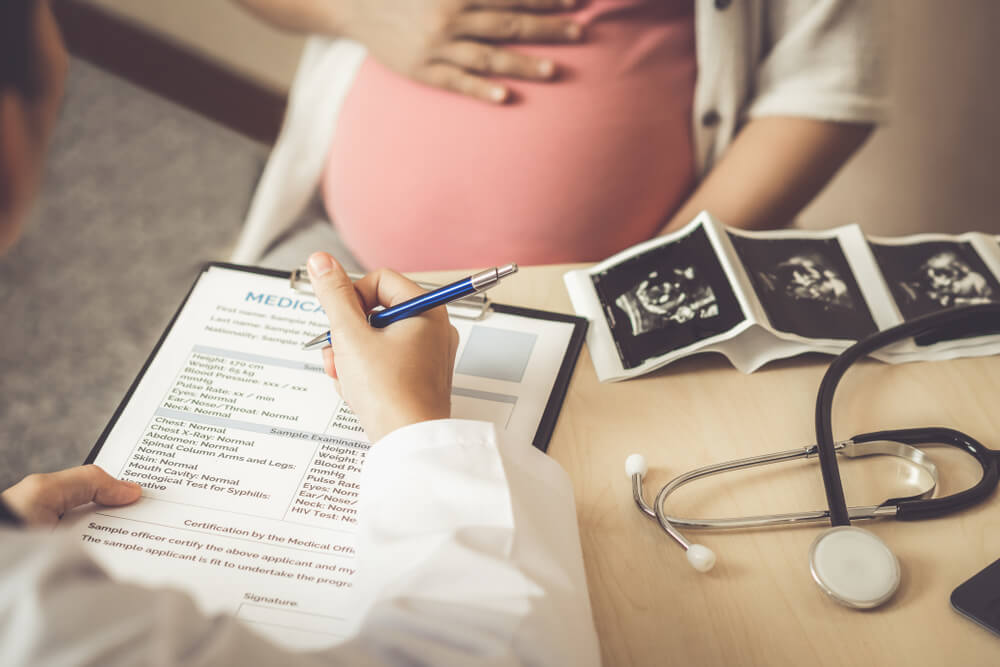Your first prenatal care visit usually involves a lot of tests and discussions. Your doctor will walk you through your medical history and perform several tests. Depending on the nature of your pregnancy, prenatal care visits will likely be shorter as you progress. However, some tests and examinations are done at every prenatal visit, no matter the stage of pregnancy. Read on to find out what happens at every prenatal visit.
Prenatal Physical Examination
At every prenatal visit, you will get a physical examination. During first-trimester care, the examination includes a comprehensive medical, family, and social history. Information obtained during a prenatal care exam is necessary to help ensure that you remain healthy during your pregnancy. The doctor might also look at the father’s medical history to get an idea of the genetic factors that might affect the baby.
A prenatal physical examination also includes some regular components of a physical exam that you would get when you visit your primary care provider. During first-trimester care visits, you will get a thorough pelvic examination as you would with your gynecologist. The purpose of this physical examination is to ensure that you do not have any medical issues that might end up affecting your pregnancy.
Tests Done During a Prenatal Care Physical Exam

Several tests are performed during a prenatal physical exam. These include prenatal care pap smears, tests for STDs, urine tests, bloodwork, and ultrasounds. The doctor will want to know your blood type and find out if you have any specific conditions that can cause congenital disabilities or complications during pregnancy. Blood samples and tests can also help determine if you currently display signs of cancer, infection, or exposure to harmful substances that could affect your baby’s health.
During the physical exam, the doctor will check the size of your uterus to assess the baby’s growth rate and determine if you might be having more than one fetus. To confirm these findings, the doctor might also use a dating sonogram. It is important to share any details about your family’s medical history with your doctor during the physical examinations. If you are taking any medication, you should also inform the doctor, including any allergies that you might have. This should be done as early as first-trimester care visits.
If you have had abnormal pap smears in the past, they should know about this as well. Also, you should not leave out a history of battering, abuse, abortion, or any procedures that were
carried out on your uterus or cervix. These details are very important, and they will help the doctor provide the safest care for your child. If you have any questions, make a list and take it with you to your prenatal visit during first and second-trimester care visits.
Checking Weight and Blood Pressure
High blood pressure is a problem during pregnancy. There are many reasons why pregnant women are more prone to high blood pressure. That is why health care providers always check your blood pressure whenever you go for your first and second-trimester care visit. If you have blood pressure and it is not detected, many things can go wrong. For instance, you might end up having decreased blood flow to the placenta. If this happens, your baby will start receiving inadequate oxygen and fewer nutrients.
Unfortunately, this will lead to low birth weight or premature birth. Furthermore, babies born prematurely will have breathing problems and an increased risk of infection, among other complications. Apart from that, poorly controlled high blood pressure can also lead to brain injury, lung and heart damage, and damage to other major organs. If it is not attended to, it can end up being life-threatening.
Checking of the Baby’s Heartbeat
At every prenatal visit, the health care provider will check your baby’s heartbeat. They will measure the heart rate and rhythm of your baby’s heart as part of prenatal screening. This is very important, and it provides a lot of insight into the baby’s condition.
While this procedure is done during every visit, it is more important during second-trimester care onwards. The heart rate of the fetus sometimes changes due to changes in uterine conditions. If your health care provider detects an abnormal fetal heart rate, it might indicate that your baby is not receiving enough oxygen. It might also indicate a variety of other problems.
When you are having a high-risk pregnancy, it is imperative to have the heart rate of your baby monitored. This is especially true if you have diabetes or high blood pressure. Your pregnancy is also considered high-risk if the fetus is not growing at the expected rate. If you are taking any medications during pregnancy, fetal heart rate can be used to assess the effect of those medicines on the baby during prenatal screening.
Weight Measurement During Prenatal Visits

It is essential to monitor your weight during pregnancy. Many dramatic changes occur in the body during pregnancy, and weight gain is one of them. You should avoid inappropriate weight gain during pregnancy at all costs. That is why the OB/GYN will check your weight at every prenatal screening. Research shows that maternal obesity is one of the most common factors that contribute to high-risk pregnancies. When a woman gains too much weight during pregnancy, this can cause several short and long-term health risks. Additionally, it will also cause complications during delivery.
Apart from the usual problems, obesity during pregnancy can also cause a child to be predisposed to developing obesity, metabolic syndrome, and diabetes early on in life. For women, there is also a high risk of pre-eclampsia, miscarriage, and gestational diabetes. That is why doctors make it a point to monitor weight during pregnancy. Monitoring the mother’s weight during pregnancy will significantly influence the birth weight of the baby as well. This is a key determining factor when it comes to short and long-term health conditions.
You Get Asked About Baby’s Movement in the Womb.
Fetal movements can provide doctors with insights into the health of your baby. During early pregnancy, you will most likely experience a few flutters now and then. However, as your baby grows, their movements will start getting stronger, and you will feel them more frequently.
Research shows that later in pregnancy, the baby will move as much as 30 times per hour. You must also note that babies tend to move more during certain times in the day. This is because they alternate between alertness and sleep. Usually, babies will be very active between 9 p.m. and 1 a.m. This is also the time when the mother is trying to sleep. The changes in activity levels are because of the mother’s changing blood sugar levels. It is also important to understand that babies are responsive to sounds or touch.
These are the tests and procedures done at every prenatal visit to monitor your health and the baby’s health. If you have any questions regarding what happens during every prenatal visit, you can contact us. Our specialists have years of experience helping pregnant mothers and carrying out prenatal examinations. As such, you can trust that our advice is sound.



